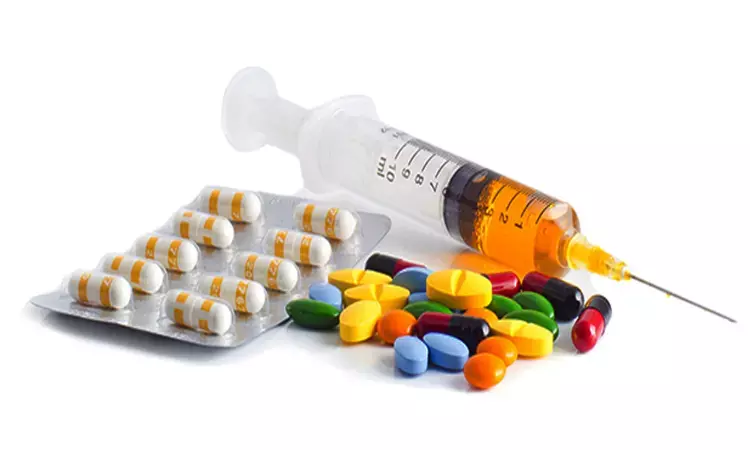- Home
- Medical news & Guidelines
- Anesthesiology
- Cardiology and CTVS
- Critical Care
- Dentistry
- Dermatology
- Diabetes and Endocrinology
- ENT
- Gastroenterology
- Medicine
- Nephrology
- Neurology
- Obstretics-Gynaecology
- Oncology
- Ophthalmology
- Orthopaedics
- Pediatrics-Neonatology
- Psychiatry
- Pulmonology
- Radiology
- Surgery
- Urology
- Laboratory Medicine
- Diet
- Nursing
- Paramedical
- Physiotherapy
- Health news
- Fact Check
- Bone Health Fact Check
- Brain Health Fact Check
- Cancer Related Fact Check
- Child Care Fact Check
- Dental and oral health fact check
- Diabetes and metabolic health fact check
- Diet and Nutrition Fact Check
- Eye and ENT Care Fact Check
- Fitness fact check
- Gut health fact check
- Heart health fact check
- Kidney health fact check
- Medical education fact check
- Men's health fact check
- Respiratory fact check
- Skin and hair care fact check
- Vaccine and Immunization fact check
- Women's health fact check
- AYUSH
- State News
- Andaman and Nicobar Islands
- Andhra Pradesh
- Arunachal Pradesh
- Assam
- Bihar
- Chandigarh
- Chattisgarh
- Dadra and Nagar Haveli
- Daman and Diu
- Delhi
- Goa
- Gujarat
- Haryana
- Himachal Pradesh
- Jammu & Kashmir
- Jharkhand
- Karnataka
- Kerala
- Ladakh
- Lakshadweep
- Madhya Pradesh
- Maharashtra
- Manipur
- Meghalaya
- Mizoram
- Nagaland
- Odisha
- Puducherry
- Punjab
- Rajasthan
- Sikkim
- Tamil Nadu
- Telangana
- Tripura
- Uttar Pradesh
- Uttrakhand
- West Bengal
- Medical Education
- Industry
Long term Steroid use raises risk of diabetes, high BP and blood clots in kids: Study

Children who take oral steroids to treat asthma or autoimmune diseases have an increased risk of diabetes, high blood pressure, and blood clots, according to Rutgers researchers.
The study, which was published in the American Journal of Epidemiology, examined the records of more than 933,000 US children from ages 1 to 18 with or without autoimmune diseases, such as inflammatory bowel disease, juvenile arthritis or psoriasis. Among those without an autoimmune disease, about two in three children who received prescriptions for steroids had evidence of asthma.
"The rates of diabetes, high blood pressure and blood clots from oral steroids have been studied in large populations of adults. However, there are reasons to think these findings might be different in children, who not only tend to take steroids differently than adults but also have much lower baseline risks of developing these same cardiovascular and metabolic conditions. This study allowed us to put numbers on the association between oral steroids and rare, but potentially serious, complications in children," said study author Daniel Horton, an assistant professor of pediatrics and epidemiology at Rutgers Robert Wood Johnson Medical School.
The researchers found that children who were receiving high steroid doses experienced these complications at much higher rates than children taking low doses or who had taken steroids previously. Among the complications studied, high blood pressure occurred most commonly with steroid treatment. All of these complications were more common among children with autoimmune diseases, independent of the steroid effect.
"While children receiving high-dose steroids were at substantially higher risk for developing diabetes, high blood pressure or blood clots relative to children not taking these medicines, the absolute risks of these complications were still small. The vast majority of children taking brief courses of steroids for conditions such as asthma, for instance, will not experience these complications," Horton said.
Hina Zahid Joined Medical Dialogue in 2017 with a passion to work as a Reporter. She coordinates with various national and international journals and association and covers all the stories related to Medical guidelines, Medical Journals, rare medical surgeries as well as all the updates in the medical field. Email: editorial@medicaldialogues.in. Contact no. 011-43720751
Dr Kamal Kant Kohli-MBBS, DTCD- a chest specialist with more than 30 years of practice and a flair for writing clinical articles, Dr Kamal Kant Kohli joined Medical Dialogues as a Chief Editor of Medical News. Besides writing articles, as an editor, he proofreads and verifies all the medical content published on Medical Dialogues including those coming from journals, studies,medical conferences,guidelines etc. Email: drkohli@medicaldialogues.in. Contact no. 011-43720751


